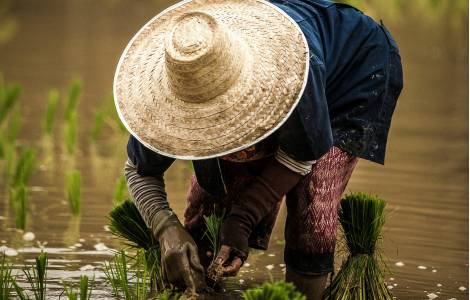
Foto di Eduardo Prim su Unsplash
Manila (Agenzia Fides) - The state of “food emergency” declared by the Philippine government to counter the “rice crisis” - due to an “extraordinary” increase in the price of the country's staple food - “is an economic problem, but it also has political implications: we are in the electoral campaign, with a view to the elections in May, and the rice issue will influence this period. It will be used by politicians to capitalize on the consensus for or against President Marcos”, underlines Antonio Ledesma, Archbishop Emeritus of Cagayan de Oro on the island of Mindanao, in an interview with Fides.
“In Mindanao”, says the Jesuit, “there is discontent at the moment, but people can still buy rice at the market. Of course, this is an important issue and we are in a precarious balance”. "There are farmers who have a low income from growing rice for sale," the Archbishop continued. "Their situation overlaps with the problem of imports, since domestic demand in the Philippines cannot be met by local production. Making the country self-sufficient in rice needs and finding measures to achieve this is an open and protracted problem.
These are all issues that affect the common good, but they are now entering the electoral campaign and are in danger of being instrumentalized," he explains.
The declaration of rice food emergency was signed on February 4 and allows for the release of rice stocks from the National Food Authority (NFA) to stabilize prices "and ensure that rice, a staple food for millions of Filipinos, remains accessible to consumers," said Agriculture Secretary Francisco Tiu Laurel Jr. A release of 300,000 tons of rice, about 30,000 per month, is planned for a period of 10 months to stabilize the market through lower prices. The NFA will start selling its rice stocks in selected markets to government-controlled companies at a price of 36 pesos per kilo, while rice currently sells between 50 and 60 pesos per kilo. This will benefit both consumers and local farmers as rice will be available at a lower price. The food safety emergency will remain in effect until it is lifted by the department. In this regard, Laurel stressed that food prices have remained high despite the decline in global rice prices and the reduction of tariffs on imported rice in July 2024. According to the Philippine Statistics Authority (PSA), rice inflation reached 4.2 percent at the end of 2024, with a steady increase. In this situation, welfare programs for the sale of cheaper rice in centers and outlets under the "Rice for all" program were launched to help the country's citizens, especially from the poorer sections of the population. In the Catholic communities, to support the food security of the poorest, the "Pondo ng Pinoy" program is active, an anti-poverty initiative that was first launched in the Diocese of Manila in 2004 and has now spread to 30 dioceses. The basis of the program is the formula "a little for many", in which as many people as possible are invited to donate 25 cents every day as a gesture of charity towards those in need. (PA) (Agenzia Fides, 7/2/2025)